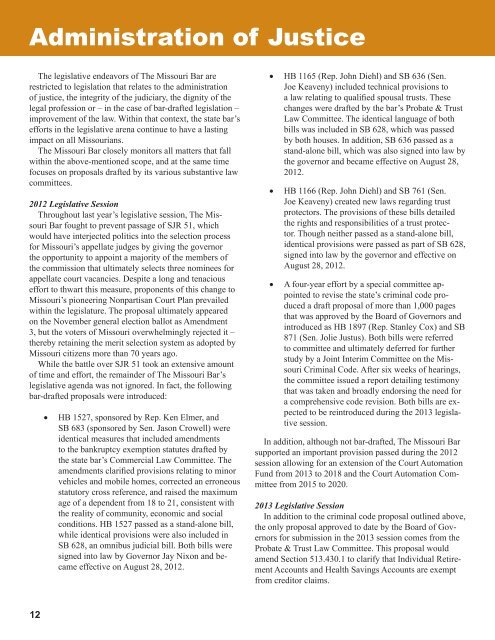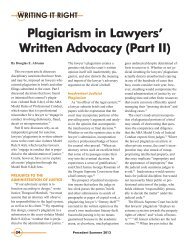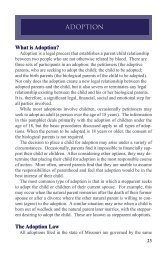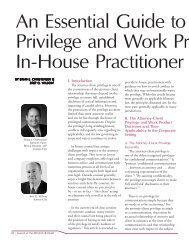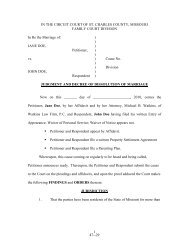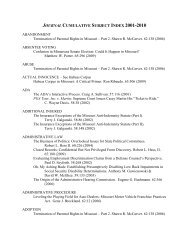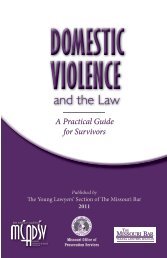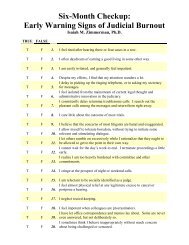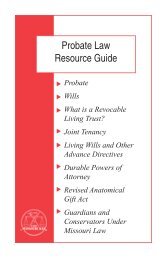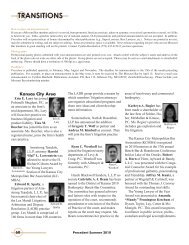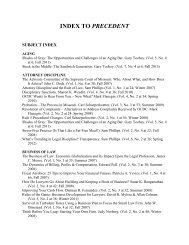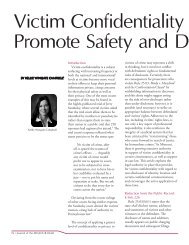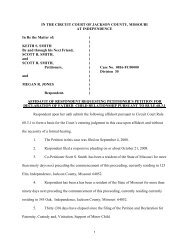Full Report - the Missouri Bar
Full Report - the Missouri Bar
Full Report - the Missouri Bar
Create successful ePaper yourself
Turn your PDF publications into a flip-book with our unique Google optimized e-Paper software.
Administration of Justice<br />
The legislative endeavors of The <strong>Missouri</strong> <strong>Bar</strong> are<br />
restricted to legislation that relates to <strong>the</strong> administration<br />
of justice, <strong>the</strong> integrity of <strong>the</strong> judiciary, <strong>the</strong> dignity of <strong>the</strong><br />
legal profession or – in <strong>the</strong> case of bar-drafted legislation –<br />
improvement of <strong>the</strong> law. Within that context, <strong>the</strong> state bar’s<br />
efforts in <strong>the</strong> legislative arena continue to have a lasting<br />
impact on all <strong>Missouri</strong>ans.<br />
The <strong>Missouri</strong> <strong>Bar</strong> closely monitors all matters that fall<br />
within <strong>the</strong> above-mentioned scope, and at <strong>the</strong> same time<br />
focuses on proposals drafted by its various substantive law<br />
committees.<br />
2012 Legislative Session<br />
Throughout last year’s legislative session, The <strong>Missouri</strong><br />
<strong>Bar</strong> fought to prevent passage of SJR 51, which<br />
would have interjected politics into <strong>the</strong> selection process<br />
for <strong>Missouri</strong>’s appellate judges by giving <strong>the</strong> governor<br />
<strong>the</strong> opportunity to appoint a majority of <strong>the</strong> members of<br />
<strong>the</strong> commission that ultimately selects three nominees for<br />
appellate court vacancies. Despite a long and tenacious<br />
effort to thwart this measure, proponents of this change to<br />
<strong>Missouri</strong>’s pioneering Nonpartisan Court Plan prevailed<br />
within <strong>the</strong> legislature. The proposal ultimately appeared<br />
on <strong>the</strong> November general election ballot as Amendment<br />
3, but <strong>the</strong> voters of <strong>Missouri</strong> overwhelmingly rejected it –<br />
<strong>the</strong>reby retaining <strong>the</strong> merit selection system as adopted by<br />
<strong>Missouri</strong> citizens more than 70 years ago.<br />
While <strong>the</strong> battle over SJR 51 took an extensive amount<br />
of time and effort, <strong>the</strong> remainder of The <strong>Missouri</strong> <strong>Bar</strong>’s<br />
legislative agenda was not ignored. In fact, <strong>the</strong> following<br />
bar-drafted proposals were introduced:<br />
• HB 1527, sponsored by Rep. Ken Elmer, and<br />
SB 683 (sponsored by Sen. Jason Crowell) were<br />
identical measures that included amendments<br />
to <strong>the</strong> bankruptcy exemption statutes drafted by<br />
<strong>the</strong> state bar’s Commercial Law Committee. The<br />
amendments clarified provisions relating to minor<br />
vehicles and mobile homes, corrected an erroneous<br />
statutory cross reference, and raised <strong>the</strong> maximum<br />
age of a dependent from 18 to 21, consistent with<br />
<strong>the</strong> reality of community, economic and social<br />
conditions. HB 1527 passed as a stand-alone bill,<br />
while identical provisions were also included in<br />
SB 628, an omnibus judicial bill. Both bills were<br />
signed into law by Governor Jay Nixon and became<br />
effective on August 28, 2012.<br />
• HB 1165 (Rep. John Diehl) and SB 636 (Sen.<br />
Joe Keaveny) included technical provisions to<br />
a law relating to qualified spousal trusts. These<br />
changes were drafted by <strong>the</strong> bar’s Probate & Trust<br />
Law Committee. The identical language of both<br />
bills was included in SB 628, which was passed<br />
by both houses. In addition, SB 636 passed as a<br />
stand-alone bill, which was also signed into law by<br />
<strong>the</strong> governor and became effective on August 28,<br />
2012.<br />
• HB 1166 (Rep. John Diehl) and SB 761 (Sen.<br />
Joe Keaveny) created new laws regarding trust<br />
protectors. The provisions of <strong>the</strong>se bills detailed<br />
<strong>the</strong> rights and responsibilities of a trust protector.<br />
Though nei<strong>the</strong>r passed as a stand-alone bill,<br />
identical provisions were passed as part of SB 628,<br />
signed into law by <strong>the</strong> governor and effective on<br />
August 28, 2012.<br />
• A four-year effort by a special committee appointed<br />
to revise <strong>the</strong> state’s criminal code produced<br />
a draft proposal of more than 1,000 pages<br />
that was approved by <strong>the</strong> Board of Governors and<br />
introduced as HB 1897 (Rep. Stanley Cox) and SB<br />
871 (Sen. Jolie Justus). Both bills were referred<br />
to committee and ultimately deferred for fur<strong>the</strong>r<br />
study by a Joint Interim Committee on <strong>the</strong> <strong>Missouri</strong><br />
Criminal Code. After six weeks of hearings,<br />
<strong>the</strong> committee issued a report detailing testimony<br />
that was taken and broadly endorsing <strong>the</strong> need for<br />
a comprehensive code revision. Both bills are expected<br />
to be reintroduced during <strong>the</strong> 2013 legislative<br />
session.<br />
In addition, although not bar-drafted, The <strong>Missouri</strong> <strong>Bar</strong><br />
supported an important provision passed during <strong>the</strong> 2012<br />
session allowing for an extension of <strong>the</strong> Court Automation<br />
Fund from 2013 to 2018 and <strong>the</strong> Court Automation Committee<br />
from 2015 to 2020.<br />
2013 Legislative Session<br />
In addition to <strong>the</strong> criminal code proposal outlined above,<br />
<strong>the</strong> only proposal approved to date by <strong>the</strong> Board of Governors<br />
for submission in <strong>the</strong> 2013 session comes from <strong>the</strong><br />
Probate & Trust Law Committee. This proposal would<br />
amend Section 513.430.1 to clarify that Individual Retirement<br />
Accounts and Health Savings Accounts are exempt<br />
from creditor claims.<br />
12


